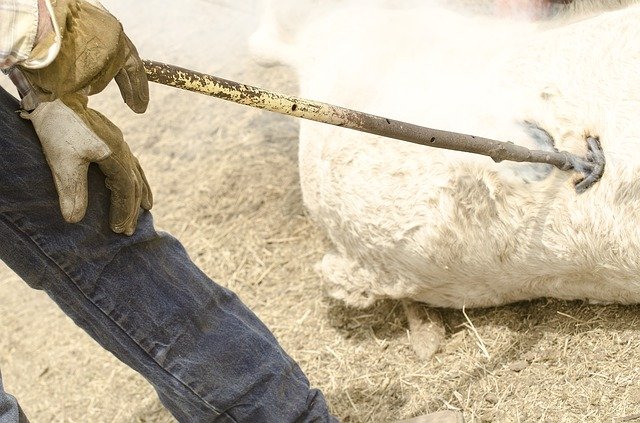Twenty years ago the suggestion that business had to think about social impact rather than just profit would have been laughed at. This has changed. Brands must transcend fluff and image to ensure their social license can bear scrutiny.
The idea of branding originated in cattle farming, when farmers shared land and farmers used a hot iron on their animals skin to identify them and confirm ownership.

First brands were worn by cattle
Over time as animals went to market, customers came to learn that some cattle were better than others – for example better fed or less likely to get sick. Some cattle sold for more money than others based on their brand. The brand became imbued with stories of the farmer and the reputation of the farm.
Brand might be regarded as the intangible value of a product, or the amount of money you can charge above commodity cost.
However traditional ideas about brand do not work well in the context of social licensing. Social license refers to the ongoing acceptance of your organisation’s business practices and ways of operating by your stakeholders. If you lose social license, you lose the legitimacy to continue – so therefore social license can be considered as another form of intangible value.
However, the difficultly is that traditional marketing tries its best to create a perception or image that customers will pay more for (e.g. using celebrity endorsements) – but the reality can be different to that perception. Applying this thinking to social license – at a minimum feels uncomfortable or exploitative.
Cultivating social license is distinctly different to traditional marketing in at least three fundamental ways:
- The Trust Difference
In traditional marketing, consumers knowingly buy into the myth created by the brand – think perfume advertising. This type of myth peddling backfires when applied to social licensing. I think we saw this in the push back against Origin Greens marketing initiative for Irish Food with Saoirse Ronan as the celebrity voice.
This is because social license is an immature space – nothing is well established here, and trust is low. As an organisation looking to build social license – you cannot assume that consumers trust you. Start from there…
- Needs are different
Traditional marketers create needs customers did not know they had. For example, “washes whiter”. Whoever thought there were different shades of white or that one shade was worth more than another.
In contrast, social licensing is about connecting with much more fundamental needs around safety, honesty and kindness. Abstractions get in the way and can look like a deliberate attempt to dupe or distract. For social license – stop being clever!
- Competition Matters Less
Traditional marketing is about stealing a march on competitors. For social licensing, your competition is more likely to be the way things are now, conventional beliefs and behaviours that are rooted in culture, the status quo or possibly bad actors in your sector.
In cultivating social license, you are the challenger, deliberately counter conventional for social good. So rather than thinking about beating the competition, think about who you might partner with. Who already has the trust of your stakeholders – perhaps it is a government agency or some other institution? F
or social licensing it is about moving from a mind-set of individual winning to shared leadership.
So while traditional branding and social license are different concepts that ask different questions of your organisation – this is not an either/or situation. There are several reasons you will want to imbue your brand with the permissions afforded by a strong social license.
Brand and Social License Together
Brand and social license act in tandem when they both communicate a promise of consistency associated with making changes that are needed to make the world a better place.
Brand and social license together enable your customers to advocate for your organisation in a much more generative relationship to exponentially extend the reach of your brand.
Brand and social license enable you to bring coherence to complex organisations – where social license can be the connective tissue that make sense of all the different pieces that make up your brand.
Customers will fall in love with you when you can marry the functional and status value of your brand with the social understanding of who you are, what you do and your willingness to stand with your customers, no matter what and for the long-term benefit of all.
Read more about sustainability conundrums.
Share this on...